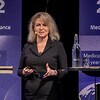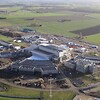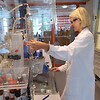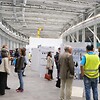Fritextsökning
Artiklar per år
Innehållstyper
-

The Swedish National Board of Health and Welfare rejects prioritising andrology as a speciality
Male infertility can be linked to a shorter lifespan and several severe diseases, but when couples who want children are examined, the focus is on the woman. Experts in the field claim that andrology needs to become a speciality in Sweden to increase awareness and knowledge. But the Swedish National Board of Health and Welfare says that it is not a priority.
-

“An entire industry is about to be wiped out”
According to Jennie Ekbeck, CEO of Umeå Biotech Incubators, Sweden risks not having any small diagnostic companies left in five years.
-

Individual DNA passport could result in fewer drug side effects
You may be required to show a DNA passport when you pick up medicines at the pharmacy in the future. According to a new study, patients might suffer 30% fewer side effects if the drug treatment is adapted to their genes.
-

Claims of life science companies fleeing abroad is a myth according to survey
The claim that life science companies are moving abroad is exaggerated. In fact, only a tiny percentage is leaving the country, according to a survey.
-

He saved lives with his theories – was ostracised and ended up in a mental hospital
Hungarian doctor Ignaz Semmelweis (1818-1865) undoubtedly possessed plenty of persistence, diligence and sound reasoning skills – but he was hardly blessed with luck and timing.
-

Snabbväxare under pandemin – nu tvingas diagnostikbolaget skära ned
Det minskade behovet av testning efter pandemin slår hårt mot diagnostikbolaget Dynamic Code, som nu aviserar ett sparpaket. Ett 20-tal medarbetare berörs, och samtidigt pausas företagets satsning i Tyskland.
-

”Alla skriker efter talang”
Att locka till sig begåvningarna är en av life science-branschens stora framtidsutmaningar. Det var en av slutsatserna i det panelsamtal som avslutade konferensen New Horizons in Biologics & Bioprocessing på torsdagen.
-

Ny ordförande för Atlas Antibodies
Åsa Riisberg, styrelseproffs och tidigare partner i EQT, tar över ordförandeklubban i Atlas Antibodies.
-

“We are Europe’s hotspot in life science”
The Medicon Valley Alliance has worked for competence development in life science in Denmark and Sweden for a quarter of a century. Anette Steenberg, CEO, sees the anniversary as a recognition of MVA’s explosive power.
-

Dynamic Codes vd slutar
Diagnostikföretaget Dynamic Codes vd Louise Nylén har beslutat sig för att lämna sin post.
-

ESS i krismöte – varnar för att projektet kan misslyckas
Beatrix Vierkorn, ESS-konsitoriets ordförande, har kallat till krismöte i Lund den 30 november. Det rapporterar Sydsvenska Dagbladet. Anledningen är förseningar och bristande kvalitet på den högteknologiska utrustningen.
-

A green nursery for biotech rooted in the Scanian soil
Red Glead has established itself as one of Lund’s largest companies in pharmaceutical development. Life Science Sweden went to Skåne and met two of the founders, Johan Evenäs and Martina Kvist Reimer.
-

The pandemic caused a reshuffle among the world’s vaccine giants – here is the new top list
Fuelled by the pandemic, the power balance in the global vaccine market has completely changed in recent years, a survey from Fierce Pharma shows
-

Extensive agreements signed at Scilifelab
Four agreements were signed between Swedish and Dutch life science players in connection with the Dutch state visit earlier this month.
-

Neutronmöte i Lund samlar hundratals toppforskare
För första gången hålls en konferens knuten till den nya forskningsanläggningen ESS i Lund. Det är Institut Laue-langevin, ILL, i Frankrike och European Spallation Source, ESS, som tillsammans samlar neutronforskare från hela världen.
-

Promising Alzheimer’s study data sends Bioarctic stock soaring
The drug candidate lecanemab from Swedish company Bioarctic significantly slowed down the deterioration in patients with early on-set Alzheimer’s, according to preliminary results from a phase III study.
-

Biosimilars bring price pressure, but are they sufficiently used?
When biosimilars were introduced just over 16 years ago, hopes were raised that they would give many more patients access to effective but otherwise extremely expensive treatments with biological drugs. So, how well has Swedish healthcare used biosimilars? The answer partly depends on whom you ask.
-

Konferens om läkemedelsformuleringar samlar branschen i Köpenhamn
Idag pågår den tionde upplagan av New Updates in Drug Formulation & Bioavailability 2022 i Köpenhamn.
-

Genes from Neanderthals can affect the correct drug dosage
A fifth of all Europeans carry gene variants inherited from Neanderthals, which cause certain drugs to break down more slowly. This may have implications for the drug doses they should take.
-

Lucy Robertshaw: Did you know Stockholm wants to be in top 5 in the world for Life Sciences?
Karolinska Institutet Solna Campus has certainly become the next “Kendall Square”, writes Lucy Robertshaw in a column.
-

BioVentureHub CEO: “Companies with a high degree of interaction achieve greater success”
For the first time since its inception, AstraZeneca’s BioVentureHub can now recruit new companies, as some of its tenants have grown significantly and are leaving the hub. This is the message from the biohub’s CEO Magnus Björsne in an interview, in which
-

Collaboration for a simpler production of gene therapies launched
A collaboration between universities and companies aims at providing better production methods for the development of gene therapies. The initiative is led by Johan Rockberg, Professor at KTH.
-

Björn Arvidsson: “We need robust and recognized ecosystems for continued competitiveness”
“We have idea carriers and excellent innovation opportunities, and now we must invest in creating ecosystems that provide them with even better growth opportunities,” Björn Arvidsson writes in a column.
-

A growing industry in Denmark: “One new life science company a week”
The life science sector in eastern Denmark continues to grow in the number of employees, as well as the number of companies. An emerging problem is the shortage of labour, a new report reveals.